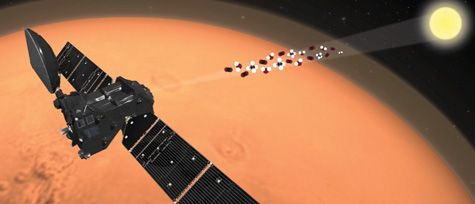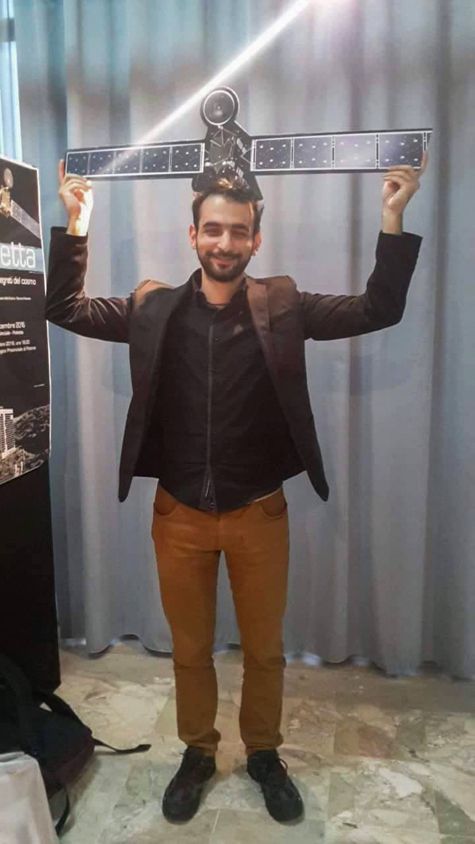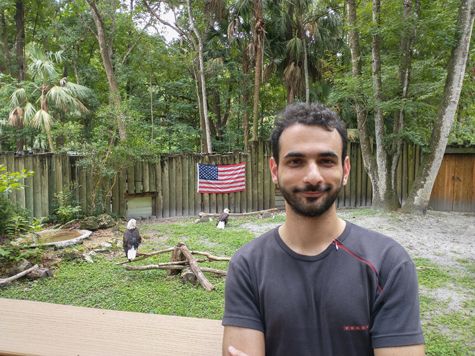Early Career Scientist Spotlight
Dr. Giuliano Liuzzi (he/him/his)
Atmospheric Spectroscopist
Planetary Systems Laboratory (693)
What inspired you to pursue a career in Planetary Science?
Since I was a kid, I knew that I always wanted to investigate and understand how the Universe works; my dad has some old astronomy books, and those were some of my first readings. Initially, I wanted to be an astronomer, spending my nights with the telescope and studying objects that were as far away as possible. Then, during my college years, I started to get interested in planetary atmospheres, thanks to my thesis supervisor, Prof. Fonti. He was an amazing human being and scientist, and I would say that great people like him who taught me a lot, together with an inborn passion for the sky, are the reasons why I do what I do today.
What science questions do you investigate?
I am an atmospheric spectroscopist, which means that I work with models and data to infer the structure and composition of planetary atmospheres. I apply this expertise in many different contexts (e.g., inner Solar System, Earth, and exoplanets) but my current focus is on Mars. As a member of the Science Team of the European Space Agency (ESA) Trace Gas Orbiter (TGO) mission, I look at the data from the infrared spectrometers onboard TGO to determine the vertical distribution of water vapor, ices, trace gases and isotopic abundances, with the aim to investigate the past evolution and present status of water reservoirs on the planet, and to figure out the interactions between surface and atmosphere. I work on several aspects of the mission. One of my first tasks was creating a calibration scheme for one of the spectrometers onboard the TGO, which is essential to correctly interpret its data. Since then, I contributed to some important science results by TGO; among them, the discovery of HCl in the atmosphere of Mars, the measurement of its isotopic composition, the first evidence of vertical variability of water vapor isotopic fractionation, the observation of water ice and CO2 ice clouds. One fundamental goal of all this work is to understand the differences between the evolution of Mars and that of Earth, whether the Martian composition deviated significantly from the proto-solar material, and why.

Credit: ESA
What is one research project that you are particularly excited about, and why?
Besides my work on Mars, I love coding and solving complex problems. In that sense, I am very excited to be part of the core science team that manages the NASA Planetary Spectrum Generator, an online tool that is capable of simulating observations of several Solar System bodies and analyzing real observations. The fact that we can provide such a complex tool for free to the community is something I am very proud of. Also, seeing how so much diverse knowledge is integrated into a single, advanced tool is teaching me a lot. I hope to bring these competencies and this passion for accessible science with me throughout my whole career and apply them to every aspect of my work.
If you were to expand your current research focus, what new topics would you explore?
On the one hand, I like to expand my focus in any direction that makes me more competent in the skills and knowledge that I need to do my job better. Right now, I would like to learn even more about how the instruments that observe planets and atmospheres are built and optimized, as I think it is important to have a critical perspective in how data are collected and analyzed. On the other hand, my pure curiosity goes towards trying to understand the deepest reasons why the worlds in our inner Solar System (Venus, Earth and Mars) are so intrinsically different today, and I would like to explore this aspect more in the near future.

Credit: Giuliano Liuzzi
What is one of your favorite moments in your career so far?
The first moment that comes to mind was the day I first came to NASA Goddard. As I was walking through the hall that goes to my office, I was beyond excited to read the name tags on the other offices and realize that I would be working with the very same people whose papers I studied! Another moment was in July 2014, when my first first-authored paper was published. It was also my birthday, so it felt like an accomplishment worth celebrating (twice!).
Tell us about a unique or interesting component of your work-life balance.
I am actually very passionate about my work, especially when it is time to tackle a very complicated problem. I find myself forgetting that days go by until I finally get that “Eureka” moment. I really enjoy this aspect of my work, and it helps me keep my sanity, even if it is unconventional. However, especially in these last months, I have worked a lot on myself to impose clear boundaries between my work and my free time. This helped a lot with establishing a more equilibrated life at times. I think in general this is really important for a scientist.
What is a fun fact about you?
Despite my immersive love for science and space, I always tried to express myself through hobbies that are, in some cases, as far away as possible from science, at a first glance. In my years in Lecce, where I studied physics at University, I loved biking for days with my friends, and I practiced acting for some time. Then, I fell in love with archery during my Ph.D. in Potenza, and I have been practicing and competing for 7 years now. All of it to say that, despite being Italian, I am horrible at soccer (although I love following it and cheering for the local team of my hometown, Taranto).

Credit: Giuliano Liuzzi
Biography
Home Town:
Taranto, Italy
Undergraduate Degree:
B.S. in Physics at Università del Salento, Lecce, Italy
Post-graduate Degrees:
M.S. in Physics and Astrophysics, Università del Salento, Lecce, Italy
Ph.D. in Environmental Engineering, Università degli Studi della Basilicata, Potenza, Italy

